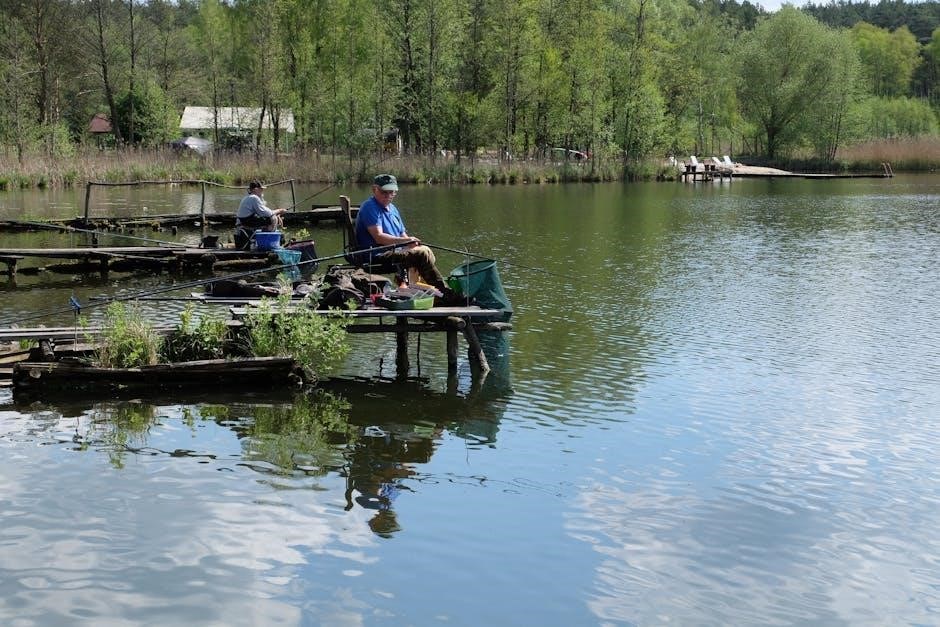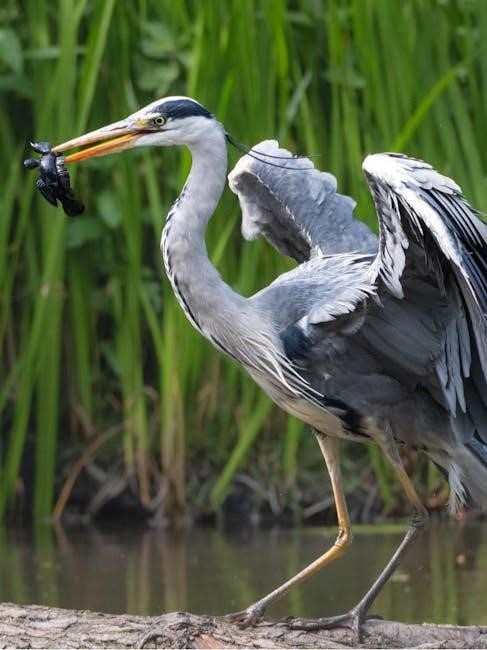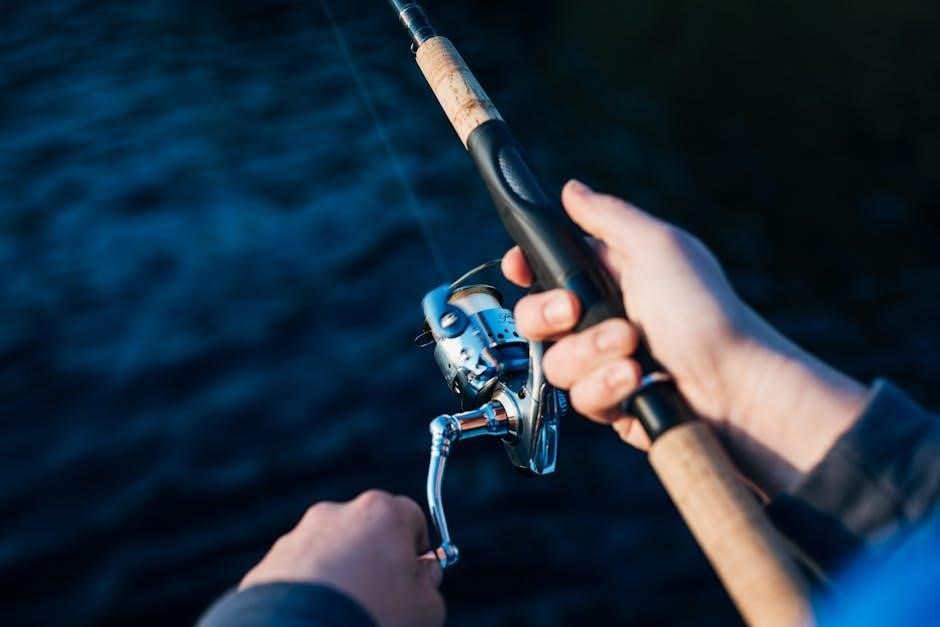Douglas Lake, a renowned fishing destination in Tennessee, offers exceptional boating and fishing experiences. Known for its abundant fish populations, including bass, crappie, and catfish, it attracts anglers from across the country.

Popular Fish Species in Douglas Lake
Douglas Lake is renowned for its diverse fish populations, including largemouth bass, smallmouth bass, crappie, catfish, and walleye, making it a hotspot for anglers seeking varied fishing experiences.
Largemouth Bass
Largemouth bass are one of the most sought-after species in Douglas Lake, known for their impressive size and aggressive behavior. The lake’s abundant vegetation and structure provide ideal habitats for these fish, making it a hotspot for bass enthusiasts. Anglers often target largemouth bass using spinnerbaits, plastic worms, and crankbaits, especially in areas with submerged logs or rocky drop-offs; Early morning and late evening are prime times for catching largemouth bass, as they tend to feed actively during these periods.
The average size of largemouth bass in Douglas Lake ranges from 2 to 6 pounds, with trophy-sized fish occasionally exceeding 10 pounds. Local fishing guides recommend focusing on shallow waters near coves and inlets, where bass often ambush prey. The lake’s warm summer months and cooler spring/fall seasons create optimal conditions for largemouth bass fishing, making it a year-round destination for anglers seeking exciting catches.
Smallmouth Bass
Smallmouth bass are a popular and aggressive species in Douglas Lake, thrilling anglers with their energetic fights. These fish thrive in the lake’s clear waters and rocky structures, making them a favorite target for both seasoned anglers and beginners. Smallmouth bass in Douglas Lake are known for their strong fighting ability and can be found near submerged rocks, weed beds, and drop-offs.
Anglers often use jigs, crankbaits, and spinnerbaits to catch smallmouth bass, especially during early morning and late evening when they are most active. The average size ranges from 1 to 4 pounds, with larger fish occasionally caught by experienced anglers. Douglas Lake’s unique combination of clear water and abundant cover creates an ideal environment for smallmouth bass, making it a must-visit destination for those seeking a challenging and rewarding fishing experience.
Crappie
Crappie are another highly sought-after species in Douglas Lake, with both white and black crappie present in significant numbers. These panfish are known for their delicate flavor and exciting fights, making them a favorite among anglers of all skill levels. Crappie in Douglas Lake tend to thrive in areas with submerged trees, brush piles, and near creek channels, where they feed on small baitfish and insects.
Anglers typically target crappie using jigs, minnows, and small spinners, often suspended beneath a bobber or cast near structure. Spring is the peak season, as crappie move into shallower waters to spawn, but they can be caught year-round with the right techniques. The average size of crappie in Douglas Lake ranges from 1 to 2 pounds, though larger specimens are occasionally landed. The lake’s clear waters and abundant cover make it an ideal location for crappie fishing, attracting anglers from across the region.

Best Fishing Spots and Hotspots
Douglas Lake, spanning over 30,000 acres, offers numerous prime fishing spots and hotspots that attract anglers year-round. The lake’s diverse structure, including submerged trees, rocky banks, and deep creek channels, provides ample opportunities to land trophy fish.
Key areas to explore include the French Broad River and Nolichucky River arms, where fish tend to congregate near drop-offs and humps. The lake’s many coves and inlets are also productive, especially during the spring and fall when fish move into shallower waters to feed.
Submerged brush piles and standing timber along the creek channels are hotspots for crappie and bass. Additionally, the rocky shoreline near the dam is a popular spot for targeting largemouth and smallmouth bass. Anglers often report success near bridges and boat docks, where fish seek shade and cover.
Seasonal patterns play a significant role in locating fish. During summer, focus on deeper structures, while in spring, concentrate on shallow areas near spawning grounds. These hotspots make Douglas Lake a must-visit destination for any serious angler.

Recommended Tackle and Gear
When fishing Douglas Lake, it’s essential to use tackle and gear suited to the lake’s diverse fish species and conditions. For largemouth and smallmouth bass, medium to heavy-action rods and reels with a minimum of 10-15 lb test line are recommended. Crappie anglers should opt for lighter tackle, including ultralight rods and 4-8 lb test line for better sensitivity.
Popular lures include soft plastics like curly tail grubs and jigs for bass, while crappie anglers often favor small jigs and minnows. Topwater baits like poppers and spinnerbaits are effective during early morning and late evening hours. Deep-diving crankbaits are ideal for targeting fish in deeper structures, especially during summer months.
Live bait such as nightcrawlers, minnows, and shad can significantly increase your chances of landing a variety of species. Trolling rigs with multiple rods can cover more water and increase productivity. Always check local regulations for specific gear restrictions to ensure a legal and enjoyable fishing experience.

Fishing Seasons and Water Conditions
Douglas Lake offers year-round fishing opportunities, with seasonal variations in water conditions and fish behavior. Spring is ideal for targeting bass and crappie as they move into shallower waters for spawning. Summer months see fish seeking deeper, cooler waters, while fall brings them back to shallower areas as the water cools. Winter fishing is slower but still productive, especially for bass and crappie using deep-diving lures.
Water levels on Douglas Lake are controlled by the Tennessee Valley Authority (TVA), which can cause fluctuations. Anglers should monitor water levels, as they significantly impact fish locations and feeding patterns. The lake typically has clear to slightly stained water, which affects lure visibility and presentation. Understanding these conditions is key to maximizing your fishing success on Douglas Lake.

Effective Fishing Techniques
On Douglas Lake, effective fishing techniques vary by species and season. For largemouth and smallmouth bass, crankbaits and spinnerbaits are highly effective, especially around submerged structures and drop-offs. Topwater baits work well during early morning and late evening when bass are active near the surface.
Crappie anglers often use jigs or minnows, targeting submerged brush piles and shallow coves. During spring spawning, crappie move into shallower waters, making them more accessible. Catfish are commonly caught using nightcrawlers or stink baits near the lake’s bottom or around bait schools.
Trolling and casting are popular methods, while some anglers prefer the precision of drop-shotting in deeper areas. Adjusting techniques based on water conditions and seasonal fish behavior is crucial for success. Understanding these strategies can help anglers make the most of their fishing experience on Douglas Lake.

Local Fishing Regulations
Fishing on Douglas Lake is regulated by the Tennessee Wildlife Resources Agency (TWRA) to ensure sustainable fishing practices. Anglers must obtain a valid Tennessee fishing license, available for both residents and non-residents, before casting their lines.
Bag limits and size restrictions apply to various species. For example, largemouth and smallmouth bass have a combined daily limit of five, with a minimum size of 15 inches. Crappie have a daily limit of 15, with no size restrictions, though conservation efforts encourage catch-and-release practices.
Seasonal closures and gear restrictions are in place to protect spawning fish and habitats. For instance, certain areas may be closed during specific times of the year to allow fish populations to recover. Only approved fishing gear, such as single-hook lures and live bait, is permitted.
Anglers are urged to familiarize themselves with local regulations to avoid fines and support conservation efforts. Updated information can be found on the TWRA website or at local bait shops near Douglas Lake.

Hiring a Professional Fishing Guide
Hiring a professional fishing guide on Douglas Lake can enhance your fishing experience significantly. Guides possess extensive knowledge of the lake, including prime fishing spots, seasonal patterns, and effective techniques for targeting specific species.
They provide expert advice on tackle selection, bait presentation, and strategies tailored to current water conditions. Additionally, guides ensure compliance with local regulations, helping anglers avoid legal issues while maximizing their catch.
Many guides offer customizable trips, catering to both novice and experienced anglers. They often supply high-quality gear, saving you the hassle of transporting and maintaining equipment. Choosing a licensed and experienced guide ensures a safe and productive day on the water.
Researching and booking a reputable guide in advance is recommended, especially during peak fishing seasons. This investment can lead to unforgettable memories and a deeper understanding of Douglas Lake’s fishing opportunities.

Safety Tips for Anglers
Ensuring safety while fishing on Douglas Lake is crucial for a enjoyable experience. Always wear a properly fitted life jacket, as accidents can happen unexpectedly.
- Check weather conditions before heading out and monitor them throughout your trip.
- Inform someone of your itinerary, including where you plan to fish and your expected return time.
- Carry a first aid kit and know how to use the items in it.
- Be aware of water conditions, such as currents or submerged obstacles, to avoid accidents.
- Handle fishing gear with care to prevent injuries from hooks or sharp objects.
- Stay hydrated and bring sunscreen to protect yourself from the sun.
- Respect other anglers and boaters, maintaining a safe distance to avoid collisions.
- Follow all local boating and fishing regulations to ensure a safe and lawful experience.
- Keep emergency contact information easily accessible in case of an incident.
By prioritizing safety, you can fully enjoy the rewarding experience of fishing on Douglas Lake.

Conservation Efforts
Douglas Lake benefits from ongoing conservation efforts aimed at preserving its ecosystem and fish populations. The Tennessee Wildlife Resources Agency (TWRA) actively manages the lake, ensuring sustainable fishing practices and water quality.
- Habitat restoration projects protect aquatic vegetation and spawning areas for fish.
- Regular fish stocking programs maintain healthy populations of species like bass and crappie.
- Water quality monitoring prevents pollution and maintains a balanced ecosystem.
- Recycling and cleanup initiatives keep the shoreline and water free from debris.
- Educational programs teach anglers about catch-and-release fishing and handling techniques.
Anglers play a vital role in conservation by adhering to regulations and reporting environmental concerns. Together, these efforts ensure Douglas Lake remains a thriving fishing destination for future generations.
Douglas Lake stands out as a premier fishing destination, offering a diverse range of fish species and exceptional angling opportunities. Known for its abundant largemouth and smallmouth bass, as well as crappie, the lake attracts both novice and experienced anglers. The combination of scenic beauty, well-maintained fishing spots, and a thriving ecosystem makes it a must-visit for anyone passionate about fishing.
Key to a successful trip is understanding the best tackle, seasonal patterns, and local regulations. Conservation efforts ensure the lake remains a sustainable fishing haven for future generations. Whether you’re seeking adventure or relaxation, Douglas Lake promises an unforgettable fishing experience. Plan your visit today and discover why it’s a favorite among anglers nationwide!
